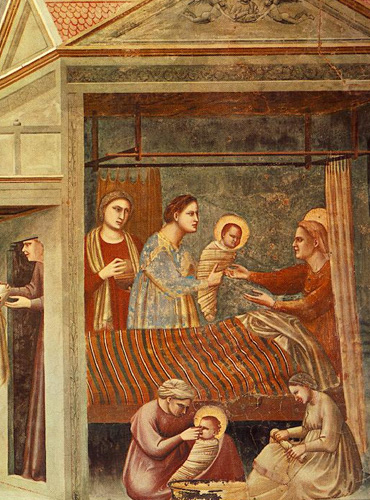Feast of the Nativity of the Blessed Virgin Mary – September 8th
Today we celebrate the nativity, or birthday, of the Blessed Virgin Mary. Usually for saints we celebrate their dies natalis, which literally means “birthday” in Latin, but refers to the day their earthly life ended and on which they were born into eternal life. However, as a Church we celebrate the birthday into this world of three people: Jesus (Christmas), John the Baptist, and Mary (also called Marymas).
Pope Saint Paul VI mentioned the importance of this feast in his exhortation Marialis cultus, wherein he writes that “particular consideration must be given to those celebrations that commemorate salvific events in which the Blessed Virgin was closely associated with her Son. Such are the feasts of the Nativity of Our Lady (September 8), ‘the hope of the entire world and the dawn of salvation.’” In other words, we celebrate our Lady’s birthday because it is the dawning of hope and salvation, the beginning of the end of sin and death.
In a homily for this feast, Saint Augustine beautifully explains how Mary contrasts with Eve. Speaking of Mary, he says: “This is she whose delivery changed the nature that we draw from our first parents, and cleansed away their offence. At her that dolorous sentence which was pronounced over Eve ended its course; to her it was never said: ‘In sorrow thou shalt bring forth children.’ [Mary] brought forth a Child, even the Lord, but she brought him forth, not in sorrow, but in joy. Eve wept, but Mary laughed. Eve’s womb was big with tears, but Mary’s womb was big with gladness. Eve gave birth to a sinner, but Mary gave birth to the sinless One. . . . For Eve’s disobedience, Mary offered obedience; and for Eve’s unbelief, Mary offered faith.”
It is in this context that we can see in the Gospel what a great blessing Mary is, the Gospel, in the longer version, wherein Matthew recounts the genealogy of Jesus. In eighteen verses, Matthew recounts all the ancestors of Jesus from Abraham. Among the surprising entries, we find:
• “Judah became the father of Perez and Zerah, whose mother was Tamar.” Matthew neglects to mention that Tamar was Judah’s daughter-in-law, and Perez and Zerah were their children because she had pretended to be a prostitute, and Judah paid for her services.
• “Salmon the father of Boaz, whose mother was Rahab.” This Rahab is thought to be prostitute as well, and it was in her inn that the spies from Israel took refuge in Jericho. As a Canaanite, she shouldn’t have been part of the chosen people.
• “Boaz became the father of Obed, whose mother was Ruth.” Ruth was a Moabite, and shouldn’t have been included in a decent Jewish family either.
• The most interesting, though, is perhaps: “David became the father of Solomon, whose mother had been the wife of Uriah.” The Second Book of Samuel takes 52 verses to describe the whole affair, from start to finish: David doesn’t go to war like he should, he can’t keep his eyes under control, he goes out of his way the find out who the woman is, he commits adultery, and then goes to great lengths to cover up his affair and ultimately to murder her husband. Yet, as terrible as these things are, even all of David’s failings play into God’s plan. In Mt 1:6, in just half the verse, as the evangelist traces out Jesus’ lineage, we hear quite simply, “David became the father of Solomon, whose mother had been the wife of Uriah.” The fruits of 52 verses of sin, and more sin, repentance, and punishment, are summarized in half a verse. The wife of Uriah shouldn’t be in the lineup of ancestors for the Savior, but she is, because God knows and sees and disposes all things.
Here, then, we can see quite clearly the “tainted nature” that we have, and yet, even in the midst of all that sinfulness, God raised up for us a savior, not because we were perfect, but rather because we needed one. We must have a “providential vision of life, to see all things as coming from the hands of God who loves us,” and that, as we read elsewhere: “all things work for good for those who love God.”
It is for this reason that Saint Augustine adds: “Let our land laugh and sing with merriment, bathed in the glory of this great Virgin’s rising. She is the flower of the fields on which the priceless lily of the valleys hath blossomed.”
Through the intercession of Mary, on her birthday, let’s ask for the grace to live in joy, knowing that even in the midst of worldly problems and difficulties, our God has raised up for us a savior and has given us so great a mother.





